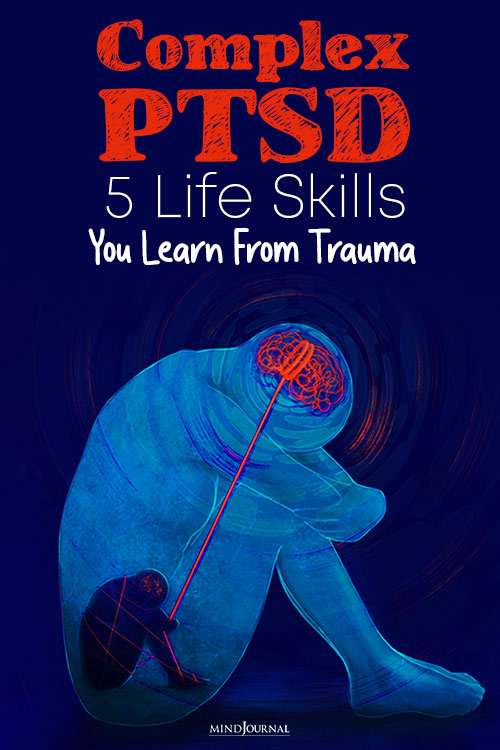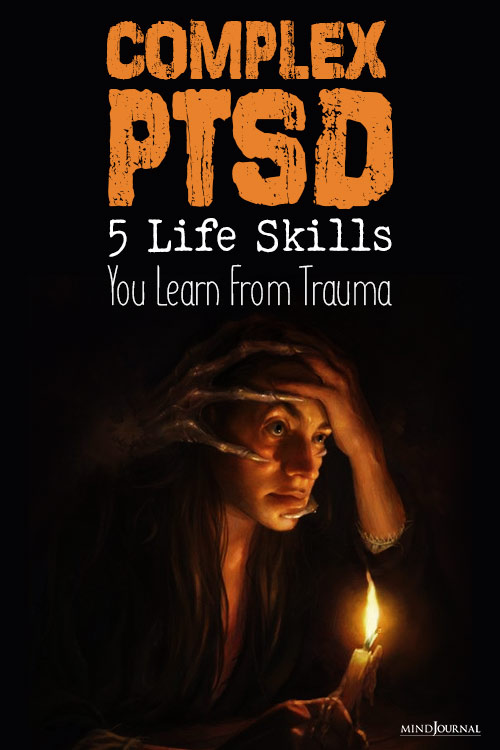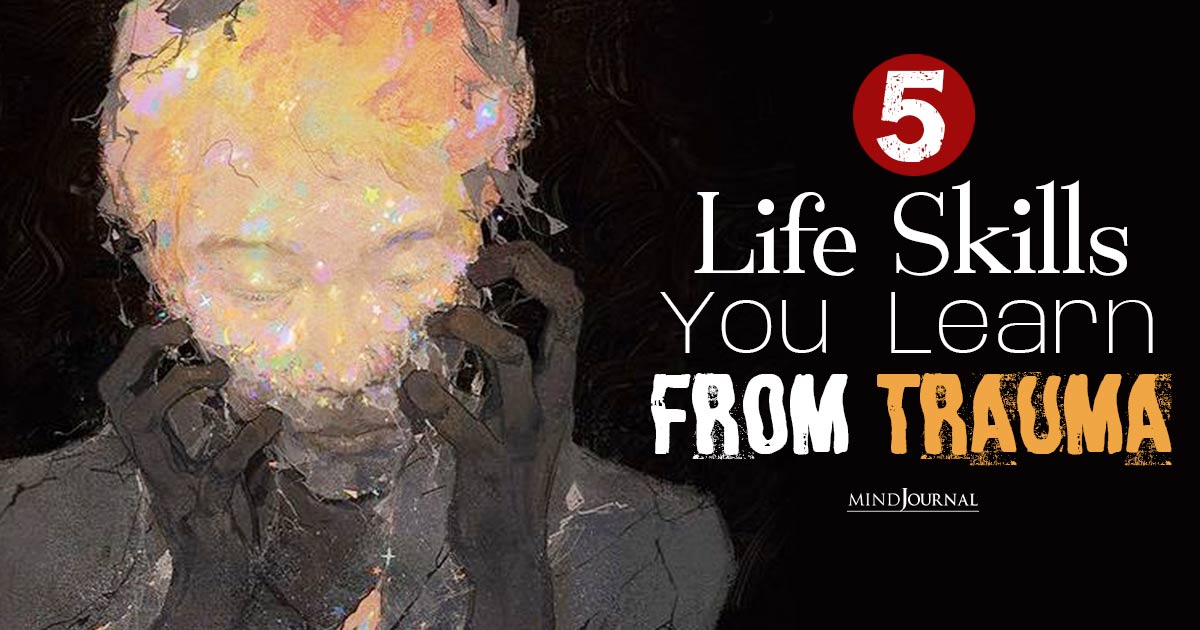Cowering before trauma will leave us scared and devastated for life. Learning from trauma will enable us to move forward with the skills needed to cope with incessant life challenges. Here are some important life skills that Complex PTSD can teach you.
The broken world of trauma
Trauma is a bitch. It ruins and destroys our minds and hearts. It shoves us down into a muddy pit full of stakes until death starts to seem like the best way out. Of course, we crawl and fight our way back up over time, but it can certainly take a serious toll on our mental and emotional health. But there is always a silver lining even in the darkest days.
All of us experience trauma. You don’t necessarily need to experience war or violence to be traumatized. Life is capable enough to completely mess us up and leave us feeling emotionally and mentally paralyzed. Of course, for people suffering from PTSD or post-traumatic stress disorder, the situation is a whole lot worse as it is a mental illness resulting in severe stress, anxiety, phobia, nightmares, and flashbacks.
Complex PTSD or C PTSD, as the name suggests, is a more complex psychological disorder that can develop due to exposure to a series of repetitive or prolonged traumatic experiences. Complex PTSD is considered to be more intense than PTSD.
Related reading: Post-Traumatic Stress Disorder (PTSD)

If you have complex post-traumatic stress disorder, you may experience the following complex PTSD symptoms-
- Interpersonal challenges
- Shame
- Guilt
- Negative self-beliefs
- Emotional dysregulation
- Feelings of emptiness
- Social withdrawal
- Hopelessness
- Anger
- Feeling misunderstood
- Depersonalization or derealisation
- Physical symptoms like headaches, stomach aches, chest pains, etc
- Suicidal thoughts
Trauma floods our body and nervous system with stress hormones and makes our rational thoughts inaccessible while putting our minds and emotions in a state of fear. It instigates the fight-flight-freeze response, leads to panic attacks, and makes us feel vulnerable and exposed.
So how can we suffer through such excruciating mental and emotional suffering and still learn valuable adaptive life skills? How can living with complex PTSD transform us into better versions of ourselves?
Surviving complex PTSD can help you learn vital life lessons! If you are someone living with these C PTSD symptoms, we highly encourage you to read on!
Related reading: PTSD: 4 Surprising Lessons From a Recent Research
Living in a post-traumatic world
Are you someone who often says “Complex PTSD ruined my life!”?
Trauma can be severely damaging. But the human spirit is an infinite power that can overcome the greatest failures and obstacles. Emotional wounds inflicted by trauma can scar us for life, but it can also teach us what we need to learn the most – skills to cope with the very same trauma and live the rest of our lives as stronger, more capable, and evolved individuals.
Trauma can destroy our world, but we can always find the strength to rebuild it. Yes, it will take time and a lot of inner strength to move forward after what you have been through, but rest assured that you will move forward. That’s what trauma teaches us – to move ahead despite the pain we have experienced, the loved ones we have lost, the abuse and neglect we had to endure since childhood, and regardless of how broken we may be – we move forward.
Related reading: 17 Warning Signs Of Complex Post-Traumatic Stress Disorder
Survivors of complex traumatic stress disorder, often suppress their natural impulses and instincts to cope with anxiety, fear, and trauma. They are more focused on their psychological, emotional, and physical survival. However, having a history of complex trauma can help us develop certain coping mechanisms and skills needed for surviving trauma, driven by our fight-flight-freeze response.

Life skills learned from C-PTSD
Psychotherapist Jennifer Lock Oman, LISW, BCD, lists down the following crucial life skills that someone dealing with complex PTSD can develop over time –
1. Working through pain
One of the most important life skills complex PTSD teaches you is to keep functioning normally even when you are facing challenges and obstacles. “Resilience after trauma is one of the most compelling phenomena in contemporary traumatic stress research,” explains a 2014 study.
Complex posttraumatic stress disorder makes us more resilient and teaches us to push through the pain and manage our emotions in times of distress. It helps us realize that we have the power of choice when going through distress and we can choose to either get overwhelmed or to learn to identify the signs of distress and cope with the situation better.
Related reading: How Toxic Family Dynamics Can Cause C-PTSD In Emotionally Intense Children
Our past traumatic experiences, anxiety, and fear of adverse events enable us to plan ahead and find the simplest solutions to the biggest problems.
2. Being more responsible
Survivors’ guilt is an outcome of trauma that makes us feel extremely guilty or assume responsibility for the traumatic event. This helps us make better sense of our negative experiences and feel more in control of our lives. However, trauma also teaches us to be responsible for our loved ones and our own selves. Although a traumatic experience is never your fault, healing from it is always your responsibility. And this is what C-PTSD helps us realize.
This is especially true if you have experienced a traumatic event in your childhood or adolescence. As trauma puts us in survival mode, we learn how to endure, take charge, find solutions, and take action to overcome adverse life experiences. It makes us more persistent, consistent, and reliable in life by turning us into responsible family members, professionals, romantic partners, friends, and human beings.
Related reading: Can Trauma Cause Memory Loss? Understanding The Link Between The Two
3. Learning to be more empathic
Researchers have recently observed that surviving traumatic events during childhood can help to boost empathy in adulthood. People with complex PTSD tend to be better able to read people and situations and hence, are more capable of appropriately responding to others’ emotions. According to a 2018 study, “on average, adults who reported experiencing a traumatic event in childhood had elevated empathy levels compared to adults who did not experience a traumatic event.” Childhood trauma can also “lead to posttraumatic growth, including increased compassion and prosocial behavior.”
The researchers suggest that traumatic childhood experiences also help to boost our perspective-taking abilities so that we are better able to understand the cognitive and affective states of others and respond to them appropriately. Trauma makes us more intuitive, kind, caring, and empathic.
Related reading: Coping With Post-Traumatic Stress Disorder (PTSD)

4. Developing competence
Adults with a complex trauma history tend to be more competent in life than others. When you are dealing with complex PTSD, it makes you feel isolated from others. You feel no one understands you and there is an invisible force field that stops you from asking for help from others. It seems like you are the only inhabitant of your trauma-ravaged world. And this is when you learn to rely on yourself to meet your needs, to heal yourself, and to survive.
You develop a can-do attitude by default and find your way through life’s challenges by being creative, courageous, and focusing on the solutions. Trauma teaches you that there is always a way out and forces you to figure your way through the mess you face in life. Trauma gives you strength that happiness and comfort never can.
Related reading: Emotional Flashbacks Due to Complex Trauma
5. Valuing relationships more
When you have been broken by neglect, abuse, and trauma, you learn to appreciate genuine connections and mutual support. Complex PTSD can leave us feeling alone and lonely which can result in social withdrawal and isolation. But once you learn to cope with your trauma, you are more inclined to seek connections with people who matter to you. This makes you put more effort into nurturing and nourishing your relationships and friendships. You make others feel comfortable and welcome as you realize the value of belongingness and connection. As a result, you are motivated to build and maintain more positive relationships.
Related reading: Do I Have PTSD? Self-Test
From Trauma to Growth

Experiencing complex PTSD can be undoubtedly devastating. But it can also lead to posttraumatic growth and optimism. But this growth can only be experienced when you let go of all the pain and past memories and focus on healing yourself. However, to reach that point where you can learn to heal yourself, you will have to go through the suffering.
When you know how to use your trauma for growth, you will be better able to find meaning in life and understand the lesson that life wants you to learn. Sadly, this transformation into an evolved individual will come through suffering, sacrifice, effort, and patience.
So make sure to trust the process. Don’t rush the process. Let the skills learned from trauma guide you into the light of healing.
Related reading: Suffered Trauma? 7 Keys To Unlocking Post-Traumatic Growth
If you or someone you know is suffering from PTSD or complex PTSD, make sure to seek medical help from a mental health professional as early diagnosis and treatment can help you manage symptoms and live a healthier and more satisfying life.
Frequently Asked Questions (FAQs):
Is there a difference between complex PTSD and PTSD?
PTSD typically occurs due to a single or multiple traumatic experiences within a short span of time, like a car crash or a natural disaster. Complex PTSD develops due to a series of traumatic events that take place repeatedly over a long period of time, like having abusive parents during childhood.
What are the 4 R’s in trauma?
According to the Substance Abuse and Mental Health Services Administration (SAMHSA), the trauma-informed approach is based on the “Four R’s”, namely – Realization about trauma, recognizing the signs of trauma, responding to trauma, and resisting re-traumatization.
Why is it important to process trauma?
When we don’t process trauma, it can lead to several physical and mental health issues like PTSD, anxiety, depression, diabetes, heart attack, stroke etc. Processing trauma allows us to grow as human beings by developing empathy, resilience & effective coping mechanisms.





Leave a Reply